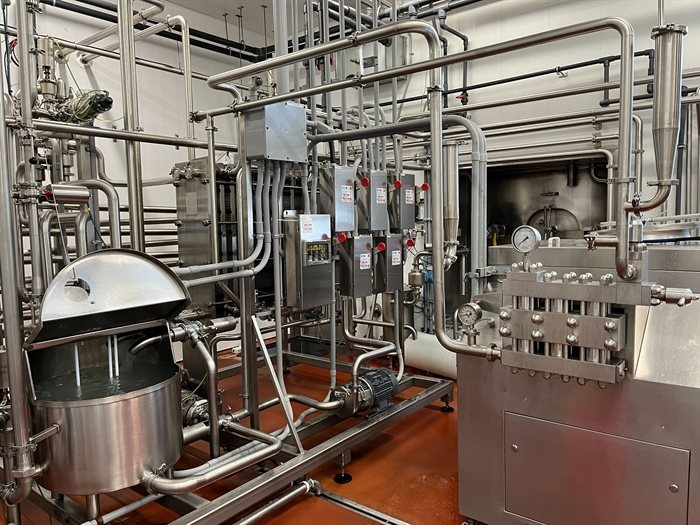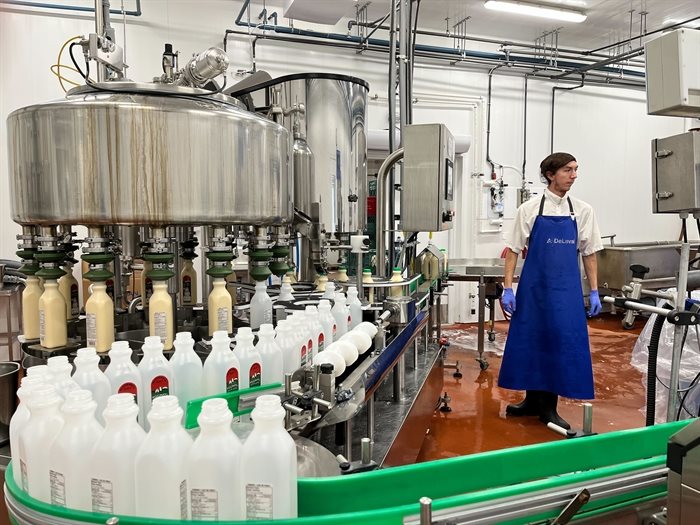iN HOLIDAYS: How Blackwell Dairy Farm makes their famous, golden eggnog

A big, busy production of fresh eggnog is underway at Blackwell Dairy Farm in Kamloops.
It is the first of three 800-litre batches of the lightly spiced favourite to be milked, mixed, measured and bottled at the interior production facility this holiday season.
“This eggnog is liquid gold and it always sell quickly,” said operations manager Laura Hunter.
The recipe for the “liquid gold” is a traditional sweet secret, but Hunter disclosed some tips on what makes the nog so creamy and delicious.
Making great eggnog, just like making regular milk, requires the freshest ingredients, a strict sanitation process and a lot of precision.
“Every new batch is tested in a lab before we go ahead and make gallons of it,” Hunter said. “We test for antibiotics and fat content. All of the milk varieties are based on levels of butterfat.”
“The eggnog recipe is always the same but we have to make sure it is perfect every time.”
The eggnog starts in a mixer before going through a stainless-steel processing facility that includes a balancer, a homogenizer and heating and cooling equipment. It then goes to holding tanks before being sent to the packaging facility to be bottled and loaded into crates for delivery.
“Our water circulates the system so we know we are ready to run when the water empties out of the balance tank and fills up with milk,” Hunter said. “The homogenizer is where the fat is broken down into tiny particles so it doesn’t settle at the top.
“The milk is heated to a high temperature to kill bacteria then cooled to 4 Celsius all in 26 seconds. Everything is monitored and recorded, it is all about precision.”
The farm has a maximum of five days to move milk from the cow to customers but typically accomplishes the task in 2.5 days.
“Fresh makes all the difference,” Hunter said. “Dairy farming is one industry where you can’t say, ‘we’ll just do it tomorrow’. It is a raw material and you can’t leave it unrefrigerated.”
READ MORE: ONE YEAR LATER: B.C. flood recovery tempered by fears of new climate disasters looming
The rooms at the facility are divided by glass so every process can easily be watched.
The process isn’t rushed when it comes to health and safety. From regular handwashing and hairnets to strict washing and disinfecting processes, the plant and the workers are diligent about keeping the product pure.
“We are inspected regularly, the dairy industry is very much inspected, so all of our stations are sanitized.”
Hunter said the cost of the milk is a bit more than what is found in a big box store, but has added value.
“We do all of our work and testing here and it is expensive when you are a small business doing small batches,” she said. “We do save costs by not having to move product back and forth between Vancouver for processing.
“We sell our product to those people that really want to connect to their food. They know where it is coming from and can taste the freshness of our milk because it doesn’t travel, it goes from the farm to the store.”
Connecting people, especially young people, to their food is a big priority for Hunter, and the company is opening up and offering more and more tours to do just that.
“It is so important for people to connect to food and we have brought out young people and school classes to learn about it,” Hunter said. “We want kids to connect to all the foods produced in the Kamloops area and learn how we bring those foods to our plates.”
READ MORE: Big White bistro gets award-winning Food Network chef
The facility temporarily went from 20,000 litres a week to 20000 litres per day during the supply interruptions that happened when floods wiped out main highways last November, 2021.
“It was wild, we had to put a call out on social media to hire workers and drivers,” Hunter said. “We quickly ran out of milk cases so the grocery stores were giving us every case they could find so we could bring them more milk.
“Farm kids were driving around to stores after school finding cases and volunteers showed up to help answer the phones.”
While the farm makes all varieties of milk, from 1% to cream to chocolate, the eggnog is always a hit.
Initially produced only for the Christmas holiday season, the nog is so popular, the company has recently expanded its production.
“We added a line of eggnog we do at Easter and this year we’re putting a fun Easter flavour twist on it,” Hunter said. “We’ve also added an eggnog that comes out at Thanksgiving.”
Blackwell Dairy started its operations in east Kamloops in 1913. In 1983 the processing plant was built and was incorporated in 1986, forming Blackwell Dairy Farm Inc.
They currently produce 2,000 litres of liquid milk product every day from their cows, as well as from nearby interior farms.
Throughout the farm’s history, family and community have been at the heart of their operations and product, and of course their cows.
“Our cows are more like pets.”
To contact a reporter for this story, email Shannon Ainslie or call 250-819-6089 or email the editor. You can also submit photos, videos or news tips to the newsroom and be entered to win a monthly prize draw.
We welcome your comments and opinions on our stories but play nice. We won't censor or delete comments unless they contain off-topic statements or links, unnecessary vulgarity, false facts, spam or obviously fake profiles. If you have any concerns about what you see in comments, email the editor in the link above.




